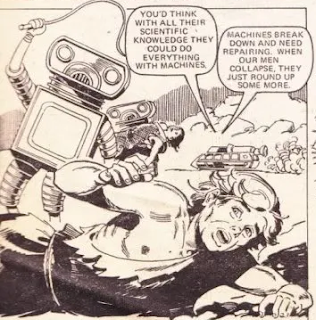There's some effort being made to redress that nowadays though, as comics that have never been reprinted in the decades since their original serialisation are finally being collected and made available. This is most notable with regards to the girls' comics of the 1970s, as the entire genre has pretty much disappeared over the past thirty years or so. It really is a crime, when you see how comics like Ace wo Nerae and Onii-sama E Oniisama are internationally renowned, while their UK equivalents have spent decades locked away unread in dusty archives somewhere. So today's subject is a recently printed volume of two stories originally printed in a magazine called Jinty, which was a sci-fi comics anthology aimed at girls, a concept that, if announced today, would enrage all kinds of foul-smelling fedora-wearers.
The first of the two stories is Land of No Tears is the story of a girl named Cassy, born with one leg shorter than the other, a trait that she uses constantly to garner sympathy and weasel out of stuff. After being anaesthetised to undergo the operation to lengthen her shortened leg, she wakes up in a future world, a tory's paradise where the hospital is reduced to rubble and no-one has sympathy for those less fortunate. In fact, any girl who dares to be imperfect in anyway is a slave to those who are. Of course, this is a comic aimed at young girls, so the secret to winning freedom is swimming and gymnastics, as there's a big sports competition for preteen girls that seems to be universally watched, and if the imperfect "gammas" can snatch victory from the perfect "alphas" in front of the world, then everything will change! Luckily, Cassy did a lot of swimming in the past as part of her physical therapy, and one of the other girls, who had her hair partially burned off as a baby, is a talented gymnast.
Before going further into the plot, I want to mention how the aliens communicate with each other in hilarious unemotional sci-fi speak, woth parents and children referring to each other as "guardian and progeny", and this meets its apex when the aliens dress Shona as one of their own for a circus show, and one of them thinks "This should part lips greatly!" But anyway, Shona's time on the other planet starts in the eponymous zoo, though it doesn't stay there long, as she serves time as a child's pet, a circus animal, and eventually gets freed into the wilderness, where she meets some human-like aliens living in caves, apparently indigenous to the planet. I don't want to say any more, as there are a lot of genuinely surpsing twists, and some pretty grim moments of horror, too.
One thing I will says is that though this story was written and originally published in the 1970s, some of the messages are incredibly relevant today. One of the aliens justifies their torture of rebellious humans with some throwaway excuse about "property damage", just like the apologists for police violence in 2010s America, and there's another scene where humans are enslaved on a farm with the explanation "Machines break down and need repairing. When our men collapse, they just round up more" given as to why the technologically advanced aliens haven't automated all their labour. As our own world quickly approaches the level of technology at which humans can be liberated from drudgery, expect to find similar excuses between the lines whenever corporate bosses and their right-wing political lapdogs make excuses as to why people are still being worked to death for a pittance.
With all of the above being kept in mind, it only makes the story's somewhat milquetoast ending more frustrating. Again, I dont want to go into specifics too much, but essentially, the day is saved when Shona, Jenny, and the native humans discover that all they needed to do to win their freedom was be nice to their oppressors. I mean, obviously this story was published in a children's comic, and obviously, the path of non-violence is probably the better one to be teaching to kids, but it still feels like a bit of an anti-cathartic wet noodle after all the indignities and violence the telepathic aliens had visited upon the humans. I still recommend the story, though, and of course, the book as a whole. If you''re at all interested in comics at all, you'd be doing yourself a disservice by ignoring it. Even though I said Land of no Tears was the better story, I wrote significantly more about The Human Zoo. Hmm.







No comments:
Post a Comment